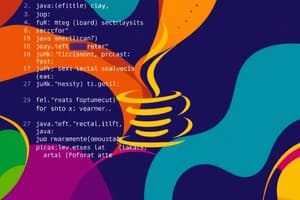Podcast
Questions and Answers
Which Java edition is specifically designed for mobile and embedded systems?
Which Java edition is specifically designed for mobile and embedded systems?
- Java SE
- Java ME (correct)
- Java EE
- JavaFX
What is the purpose of Java's bytecode?
What is the purpose of Java's bytecode?
- To serve as a platform-independent intermediate form (correct)
- To be human-readable
- To optimize memory usage
- To provide a platform-dependent format
Which of the following is NOT one of the key principles of object-oriented programming in Java?
Which of the following is NOT one of the key principles of object-oriented programming in Java?
- Inheritance
- Encapsulation
- Polymorphism
- Compilation (correct)
How does Java enhance its performance during program execution?
How does Java enhance its performance during program execution?
Which feature in Java helps with memory management by cleaning up unreferenced objects?
Which feature in Java helps with memory management by cleaning up unreferenced objects?
What concept in Java allows a class to inherit properties and methods from another class?
What concept in Java allows a class to inherit properties and methods from another class?
What role does the Security Manager play in Java's security features?
What role does the Security Manager play in Java's security features?
What is the primary advantage of Java's support for multithreading?
What is the primary advantage of Java's support for multithreading?
Who developed Java initially?
Who developed Java initially?
What was Java originally named before it was renamed?
What was Java originally named before it was renamed?
What is the primary purpose of the Java Virtual Machine (JVM)?
What is the primary purpose of the Java Virtual Machine (JVM)?
Which version of Java introduced the Swing component?
Which version of Java introduced the Swing component?
What philosophy does Java emphasize that enables portability across platforms?
What philosophy does Java emphasize that enables portability across platforms?
Which of the following is NOT a component of the Java platform?
Which of the following is NOT a component of the Java platform?
Which application area is Java primarily associated with?
Which application area is Java primarily associated with?
What is the main goal of the Java language development philosophy?
What is the main goal of the Java language development philosophy?
Flashcards are hidden until you start studying
Study Notes
Creation and Release
- Developed by James Gosling and team at Sun Microsystems in 1991.
- Originally named Oak; renamed to Java after the coffee from Java Island.
- Officially released in 1995, targeting the principle of "write once, run anywhere."
- Gained popularity for web applications, particularly Java Applets.
Major Milestones in Evolution
- Java 1.0: First stable release launched in 1996.
- Java 2 (J2SE 1.2): Released in 1998, introducing Swing, Collections Framework, and enhanced security features.
- Modern versions include Java 11, 17 (LTS), and the latest as Java 20.
Core Philosophy
- Platform Independence: Achieved through the Java Virtual Machine (JVM).
- Object-Oriented: Focuses on objects and classes for better code modularity and reusability.
Impact on Technology
- Enterprise Applications: Adopted for large-scale systems due to robustness and scalability.
- Web Development: Led the way in interactive web page development via Java Applets.
- Mobile Applications: Primary programming language for Android development.
- Adoption in Academia: Commonly used as a foundational teaching language in computer science courses.
Java Platform Components
- Java Development Kit (JDK): Contains tools needed to write and compile Java programs (compiler, debugger).
- Java Runtime Environment (JRE): Required to run Java applications, includes the JVM and essential libraries.
- Java Virtual Machine (JVM): Converts platform-neutral Java bytecode into machine code, enabling platform independence.
Java Editions
- Java SE (Standard Edition): Core Java for general-purpose programming.
- Java EE (Enterprise Edition): Designed for enterprise-level applications like web services and distributed computing.
- Java ME (Micro Edition): Optimized for mobile and embedded systems with limited resources.
- JavaFX: Platform for building rich internet applications with immersive user interfaces.
Object-Oriented Programming
- Organizes complex programs into simpler, reusable components centered around objects and classes.
- Key Concepts:
- Classes: Blueprints for creating objects.
- Objects: Instances of classes containing data and methods.
- Inheritance, Encapsulation, Polymorphism, Abstraction: Principles for managing and extending code efficiently.
Platform Independence
- Java compiles source code into bytecode, a platform-independent form.
- Bytecode can execute on any device with a JVM, enhancing program versatility and distribution.
Robustness and Security
- Automatic Garbage Collection: Manages memory by freeing up unused memory automatically.
- Exception Handling: Allows graceful error management to prevent unexpected program crashes.
- Security Features: Implements bytecode verification and a Security Manager to safeguard against harmful code and unauthorized access.
Multithreading and Performance
- Supports multithreading for simultaneous execution of different program parts, suitable for multitasking applications.
- Performance enhancements include the Just-In-Time Compiler (JIT), which translates bytecode into native machine code dynamically to improve execution speed.
Studying That Suits You
Use AI to generate personalized quizzes and flashcards to suit your learning preferences.




